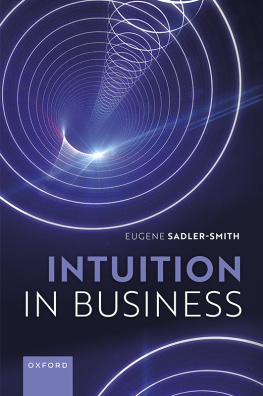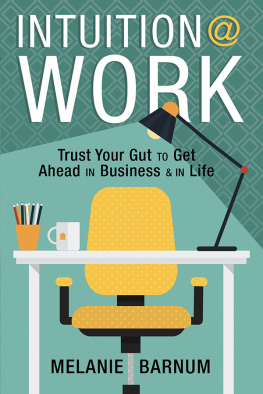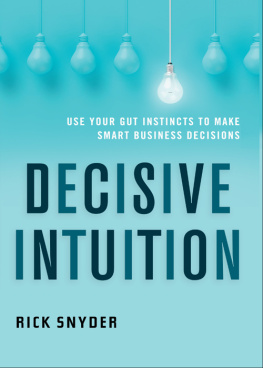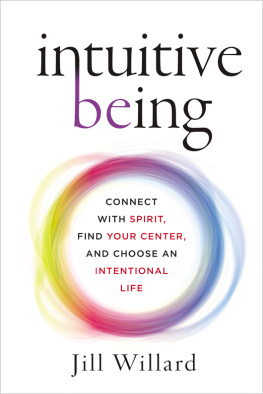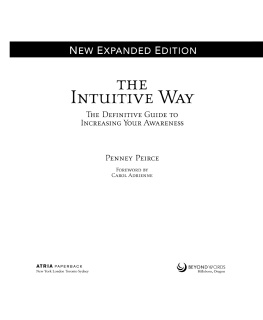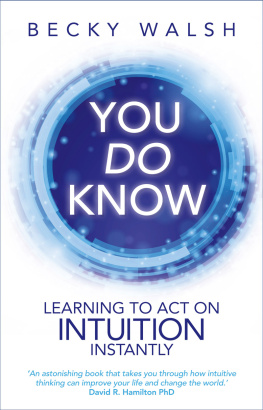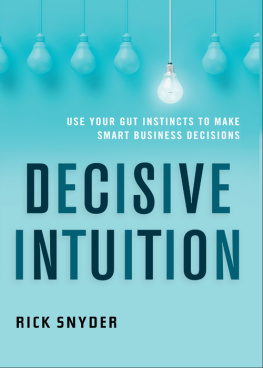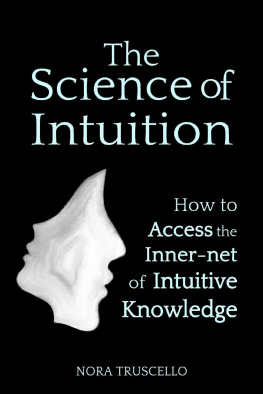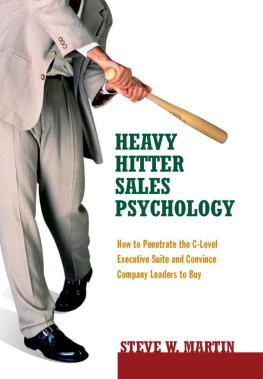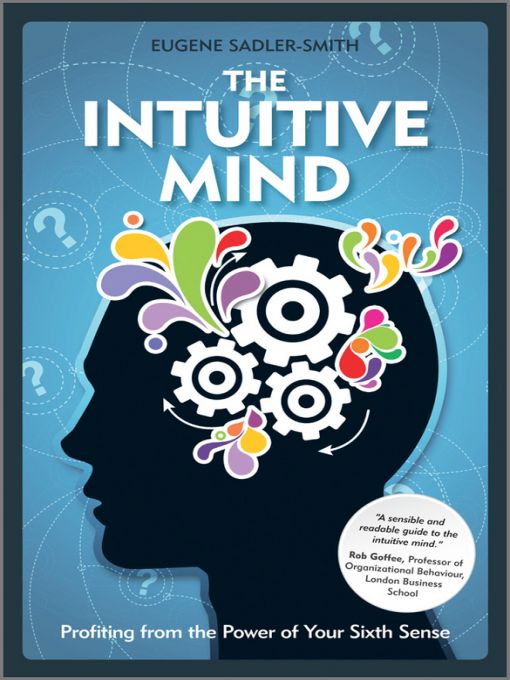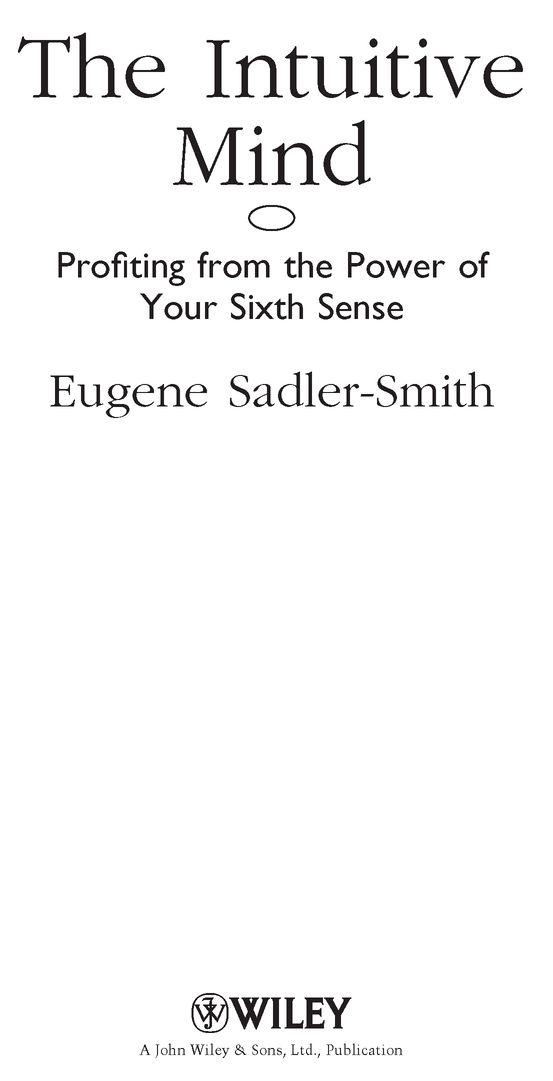Table of Contents
Praise for The Intuitive Mind ...
When times are tough skilful intuition may be our most important asset. This book provides a sensible and readable guide to the intuitive mind - what it is, how it can be developed, and the ways in which it can be applied to advantage in work and business settings.
Rob Goffee, Professor of Organizational Behaviour, London Business School
Your intuition is a powerful heuristic engine that is constantly learning from the past.
The Intuitive Mind is a fascinating and practical book that will maximize your intuition
and help you make better decisions today and predictions about tomorrow! Sigmund
Freud and Carl Jung would most assuredly approve.
Steve W. Martin, www.heavyhitterwisdom.com
Heavy Hitter Sales Psychology: How to Penetrate the C-Level Executive Suite and
Convince Company Leaders to Buy
Time and time again, we see that analytic thinking can only take us so far. In this important book, Eugene Sadler-Smith gives needed attention to the other way of thinking - intuitive - and reminds us that leadership is an art as well as a science.
Cindi Fukami, Professor of Management, University of Denver, USA
From one of our prominent thinkers in the management education arena, we learn in The Intuitive Mind how to use our intuitive judgment to improve our managerial decision making. Eugene Sadler-Smith doesnt just argue for the need for managers to understand their intuitive responses, but, in a well-illustrated and absorbing account, he shows us when and how our intuitive judgments can be harnessed and applied and how to assess their utility and validity.
Joe Raelin, The Knowles Chair for Practice-Oriented Education, Northeastern
University, USA
This timely, well researched and accessible book takes intuition out of the shadows and provides practical guidance to solve thorny problems.
Sebastian Bailey, Global Product Director, The Mind Gym
ACKNOWLEDGEMENTS
The ideas behind The Intuitive Mind are the product of many stimulating interchanges and collaborations with colleagues too numerous to mention individually in both the academic and business worlds, and including those at the University of Surrey (UK), TiasNimbas (Netherlands), Society for Organisational Learning (SOL-UK), and the European Learning Styles Network. I am very grateful to Cinla Akinci (University of Surrey) for her very careful reading of the typeset manuscript. My sincere thanks in particular go to Rosemary Nixon, Executive Editor at John Wiley and Sons, who not only commissioned the project and thereby demonstrated insight and intuition in abundance, she also thought of an inspired title for the book.
INTRODUCTION - YOUR MOST VALUABLE ASSET

In a world of uncertainty and unparalleled change people in general, and leaders and managers in particular, are forced to ask themselves fresh and searching questions about what it is that they can truly rely upon when times get tough - what are their most important and valuable assets? In the face of the 2008 credit crunch and subsequent recession of 2009 millions of ordinary people were forced to ask this very question. Was their most valuable asset the house they owned, their stocks and shares, or even their job? Regrettably events that surfaced in 2008-2009 brought home to millions across the world the fact that taken-for-granted supposed high-value assets such as property and financial wealth can nose dive out of the control of individual citizens, employees and company bosses, and leave governments standing by, virtually helpless. Shares can end up worth little more than the paper theyre written on, a home can be worth less than the mortgage taken to buy it and businesses can downsize at the drop of a hat. The wider knock-on effects of company lay-offs, closures, bankruptcy, unemployment, threats of deflation and the spectre of civil unrest can be traumatic.
But the gloom of economic recession has brought about for many people the startling realisation that the most valuable asset that an employee, leader or manager can own actually is something that cant be taken away from them or owned by someone else; its multiplier effect can be extraordinary; it can be used to create other assets such as a new job or a business venture; its perfectly natural and eminently sustainable; under the right conditions and with the right care and attention it can show real and permanent growth in value; moreover its a guaranteed lifelong asset. It can empower and emancipate citizens and employees and loosen the grip of inept and immoral leaders. As a leader, manager, employee or citizen your most valuable asset isnt held in a bank vault, or in bricks and mortar or on a company balance sheet, its held inside a much more secure but quite fragile place - your head - and is the twin portfolio of assets comprised of your analytical mind and your intuitive mind.
But why minds rather than mind? Recent scientific advances in psychology and cognitive neuroscience show that the human species has evolved two distinct systems of thinking (two minds) which are the foundations not only of our reasoning processes, but of our feelings and behaviours as well. Each of the two minds we all possess is a unique and valuable asset both in personal and professional life.
The analytical mind is the asset that our education and training sets out to nurture, condition and discipline from the time we start kindergarten to the time we leave college, and beyond; for example, many MBA courses are heavily - perhaps overly - analytical and hard-data driven. The analytical mind gives us the power to compute, reason and problem solve. However its only 50 % of the design spec that nature built into our species capacities for thinking, problem solving, creating, judging and deciding. Alongside the analytical mind, theres the mental asset that goes largely unnoticed and, certainly in most businesses, largely untapped - the intuitive mind. But if we take a closer look at the commercial world we find that there are some very significant figures who have seen its potential and realised the value of this asset.
Sony Walkman, Starbucks Coffee and Virgin, as well as being highly successful, global brands, have at least one other thing in common: the senior executives in each of these firms have claimed that spontaneous intuition and business instinct - the products of the intuitive mind - have been crucial in the management and decision-making processes of their companies. For these executives their own and the intuitive minds of their employees are vital items in the human resource base of their businesses. Indeed its not just these three, many other successful business leaders are singled out by the fact that they deploy their own intuition and that of their employees skilfully in the right place and at the right time in the management of their enterprises in the pursuit of profit and the creation of wealth.


